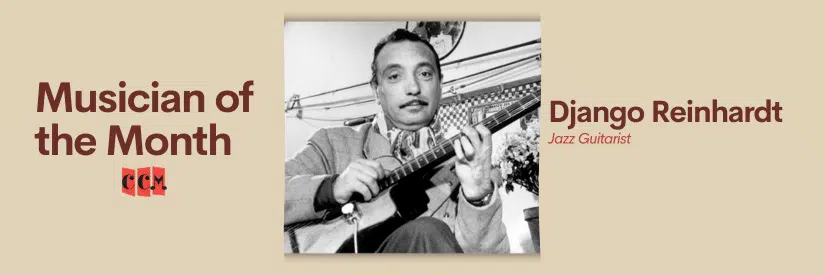January 14, 2025
Django Reinhardt: January Musician of the Month

Django Reinhardt stands as a monumental figure in the world of jazz music, renowned for his influence on jazz guitar. Born in Belgium and raised in a Manouche Romani family, his music represents his rich cultural background. Despite facing tremendous personal challenges, including a severe injury to his hand, Django’s innovative techniques and compositions have left an indelible mark on the jazz genre, particularly in the style known as hot club style jazz.
Early Life and Inspirations
Born in 1910 in Liberchies, Belgium, Django Reinhardt grew up in a nomadic family steeped in musical tradition. His early exposure to music came through his family, particularly his father who played the violin. By the age of eight, Django had taught himself to play the guitar and banjo. The vibrant musical environment of his community nurtured his burgeoning talent. His early life was not just about music; it was about surviving through art, which later heavily influenced his playing style and musical choices.
Django’s Music Career
Django’s career took a pivotal turn after he survived a caravan fire at the age of 18, which severely damaged his left hand. Despite this setback, he developed a revolutionary technique to play guitar using only two fingers on his fretting hand. His resilience propelled his career forward, and by the 1930s, he was performing in Paris’ most popular clubs. Django co-founded the Quintette du Hot Club de France with violinist Stéphane Grappelli, one of the first all-string jazz bands, which became hugely successful. Their music blended American jazz with French musette and Eastern European influences, creating a new, exciting sound.
Unique Aspects of Django’s Music
Django’s music is characterized by its vigorous rhythm and swift guitar technique, which brought a new energy to jazz guitar playing. His ability to blend elements from various musical genres—classical, flamenco, and traditional Manouch Romani music—into jazz was revolutionary. Django’s improvisational skill was unmatched, often weaving complex harmonies and melodies with apparent ease. His compositions, such as “Minor Swing” and “Nuages,” remain jazz standards, beloved for their lyrical beauty and technical prowess. Django’s influence extends beyond jazz; he has inspired generations of guitarists across various music genres.
Notable Works and Themes
Django Reinhardt’s contributions to music include over 100 recordings and numerous compositions that have become jazz standards. “Minor Swing,” as mentioned, is perhaps his most famous piece, encapsulating the essence of hot club jazz with its vibrant and infectious energy. Another significant work, “Nuages,” showcases Django’s softer, more melodic side, offering a contrast to his usually fiery compositions. These pieces not only highlight his technical skill but also his ability to convey deep emotions through music. His work during the 1940s, including sessions with American jazz legends like Duke Ellington, further cemented his legacy as a jazz icon.
Final Thoughts
Django Reinhardt’s story is one of triumph over adversity, creativity in the face of limitations, and the enduring power of music. His contributions to jazz are profound and enduring, with his style and techniques continuing to influence musicians around the globe. Django did not just play music; he lived it, and his life’s work continues to resonate with anyone who values the art of sound. Celebrating Django Reinhardt is to celebrate the spirit of innovation and the perpetual joy of musical exploration.
Sign up for a FREE introductory music lesson at The California Conservatory of Music!

